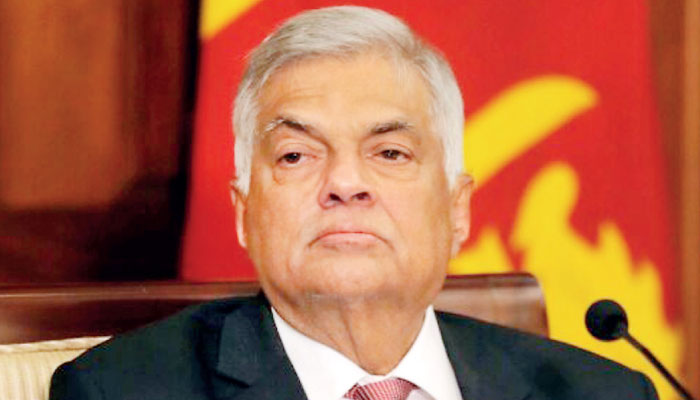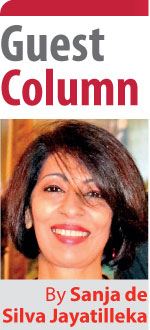Friday Feb 20, 2026
Friday Feb 20, 2026
Monday, 26 September 2022 01:58 - - {{hitsCtrl.values.hits}}

The President of Sri Lanka is feeling insecure in the extreme
 The IMF and the creditors currently in negotiations with Sri Lanka should immediately take note: the President of Sri Lanka is feeling insecure in the extreme. A relevant piece of data to be processed in their risk-analysis of the country.
The IMF and the creditors currently in negotiations with Sri Lanka should immediately take note: the President of Sri Lanka is feeling insecure in the extreme. A relevant piece of data to be processed in their risk-analysis of the country.
The extent of the chief executive’s anxiety is clearly reflected in an unorthodox move made very deliberately by him on 16 September, not a particularly eventful day, in a pretty much uneventful month. President Ranil Wickremesinghe however, interiorly cognisant that his near absolute power as President was artificially (though constitutionally) obtained outside the electoral process, has walled himself in with his security officials and military commanders through a gazette, declaring the areas around the parliament and their residences as High Security Zones.
The gazette issued on 16 September under the name of Ranil Wickremesinghe as President and Defence Minister came into effect on 23 September 2022, declaring several large areas of the peaceful Western Province as High Security Zones, where one needs to get a permit to park a car, buildings have to register all their occupants with the local police, inform of any changes to that list within 24 hours, and shouldn’t even think about assembly of any kind, however pacifistic.
All protests and processions within the zones are forbidden. Any violation or even the suspicion of a violation, can lead to the person being inspected, interrogated, detained with no bail granted except with an order from a High Court.
The areas so designated, (parts of the city which people routinely inhabit for business and leisure) are under the authority of the Secretary of Defence, General (Retd) Kamal Gunaratne, made responsible for the implementation of the gazette, and whose orders within its context are to be carried out.
Bizarre and unexpected, this gazette is suited to wartime, not a peaceful if impoverished country 13 years after its last armed conflict. It may however trigger the very thing dreaded by Presidential paranoia.
Democracy betrayed
Sri Lanka is a democracy which sees the Parliament as a place where its members represent the people. It’s where their voices, their opinions, their concerns, their welfare is paramount and are expected to be properly represented. Not a walled fortress from which the privileged few toss crumbs at them.
Up to the current Presidency, the popularly elected President was regarded also as the people’s representative, embodying their sovereignty and their mandate to rule, ensuring that the Parliament acts in accordance with the popular will of the people and for their common good, above all other considerations such as those of electorates and sectoral interests.
President Wickremesinghe doesn’t fit well into this picture. He is, in effect, an interim and transitional leader, who stepped in to the breach left by an ousted President who betrayed the mandate of the people. He was put there by a vote in the legislature, by members of the parliament who themselves had experienced the people’s absolute contempt and anger at their corruption, nepotism, decadence and weakness in not raising their voices on behalf of the people against policies that were taking the country down a precipice, which they finally did all the way down to declared bankruptcy.
The Aragalaya was a response, and a predictable one, to this decay and degeneration. It is this, the people’s legitimate response to the wickedness and betrayal by their elected leader and representatives, that now seems to form the nightmares which in turn dictates the public orders of this accidental President.
Preoccupied and manoeuvring to consolidate and extend his sudden effortless rise to the top of the mountain, he nevertheless fears the mountain, which is made up of a struggling mass of hungry, povertised, frustrated and restive people with nothing to look forward to.
Long ambitious for the post though until now with little chance of it, President Wickremesinghe has started to erect barricades against the people, instead of representing them. He has probably worked out that the logic of the situation points in a certain direction, given that he is unwilling to use this fortuitous turn of events for the good of the people.
The people had long seen that he was incapable of representing their aspirations and electorally annihilated him and his party until he popped up on a constitutional technicality back into parliament. The rest is history, but soon he may be as well. Given his level of insecurity and the people’s mistrust of him in addition to his somewhat idiosyncratic manner of governance, Sri Lanka currently has little prospect of stability. Stability is therefore being sought to be achieved instead, through repression.
Protection racket
The High Security Zone Order No. 1, as it is identified, is issued under the Official Secrets Act No. 32 of 1955. It decrees inter alia that:
- Written permission is needed to hold a public gathering on a road, ground, shore or other open area within the HTZ. No vehicle can be parked within it without a permit.
- The chief occupant of a building [within the zone] has to produce “a list of all the permanent or temporary residents to the Officer in Charge of the Police Station…when ordered to do so. Any changes have to be informed within 24 hours.”
- No fire crackers or fireworks “of any description whatsoever” within the High Security Zones.
- Any violation will come within the Code of Criminal Procedure Act, No. 15 of 1979.
- A person who violates the provisions or fails to comply with the provisions or even orders given by Kamal Gunaratne or any police officer in this regard, “shall be guilty of an offense under these orders” and shall be “liable, on conviction as per the provisions mentioned in Section 26(2) of the Official Secrets Act, to a punishment under the said section.”
- A person taken into custody under these orders shall not be granted bail except by a High Court.
The selection of areas that come under this order gives a clear insight into a particularly insecure zone of the mind of the President and perhaps his advisors:
“…areas around the Parliament Complex, Supreme Court Complex, High Court Complex in Colombo, Magistrate Court Complex in Colombo and Attorney General’s Department, Presidential Secretariat, President’s House, Sri Lanka Navy Headquarters and Police Headquarters have been declared as High Security Zones.
Areas around the Ministry of Defence and Sri Lanka Army Headquarters in Akuregoda, the Sri Lanka Air Force Headquarters in Slave Island, Prime Minister’s Office at Flower Road, Temple Trees in Kollupitiya and the Official Residencies of the Secretary to the Ministry of Defence and the Commanders of the Tri Forces, have also been declared as High Security Zones”. (Colombo Gazette)
The Bar Association of Sri Lanka (BASL) has already issued a statement cautioning the President and the Government of the unwisdom of this course of action. Its members promise to study the provisions carefully in order to ascertain its impact on the rights of the people including freedom of assembly, freedom of expression and freedom of movement. They mean to take action against any violations of the people’s fundamental rights, if these have been violated.
Its statement quotes a Judgment of the Supreme Court in the ‘Jana Ghosha’ case of Amaratunge v Sirimal and others (1993) in an effective reminder: “Stifling the peaceful expression of legitimate dissent today can only result, inexorably, in the catastrophic explosion of violence some other day.”
The President, himself a lawyer, has been warned.
Muzzling the media
It’s still not safe though. The fortress may be vulnerable. The people are an intolerable nuisance. Who incites them by reporting the news? Secure the gaps, bring down the drawbridge, muzzle the infernal media.
The Government’s spokesperson, Minister Bandula Gunawardena proposed the perfect solution to protect an imperfect administration, a regulatory framework and a broadcasting authority for the electronic media. Never before, in this oldest of democracies in Asia has the electronic media been subject to such sweeping government authority, as they regulated themselves well enough all these decades. Now the factual truth itself is dangerously subversive and the disseminators need governmental guidance.
The current moment in this country’s politics is hardly the time for a move of this sort, not second in its potential consequences to the latest gazette on High Security Zones. The people, especially the youth are more politically aware and active than they have ever been. They experienced the power of collective action, of solidarity, of unity in defiance of divisive ethnic and class politics, of the power of ideas of democratic values. They ousted a leader and his administration armed only with those ideas and a resistance to the self-indulgent political culture that had developed around a family and political parties that regarded the people with scorn. The free mass media were their indispensable partners, and will remain trusted by them far more than the politicians.
Kite flying?
The President’s declared intention (in conversation with Samantha Power) to hold a referendum in six months will be viewed with enormous suspicion now, by conscious citizens.
The BASL has already revealed that the gazette itself, issued under the Official Secrets Act does not permit the President as Minister of Defence to declare any place a High Security Zone, only to declare a ‘prohibited area’. The BASL statement also warns that the gazette ‘creates’ new offenses which are not in the principal Act it is issued under.
Already under the gaze of the international community in Geneva drafting a resolution to be taken up on 7 October on Sri Lanka for human rights violations, this latest attempt to curtail civil liberties will undoubtedly swing the vote in the Council decisively in favour of the draft resolution and may even see it being strengthened further.
President Wickremesinghe controlled his party through an autocratic party Constitution for over 25 years ensuring his perpetual leadership, and the people eventually finished it off at the last elections. Any attempt to apply that model to Sri Lanka may go a more dramatic route.